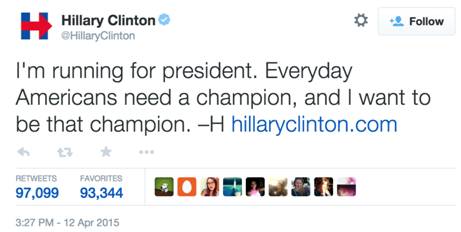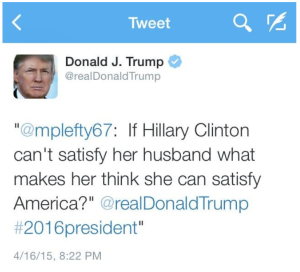TUESDAY, AUGUST 18, 2015
And Not Always For The Better
Social media is really driving the 2016 presidential race these days, as Republican and DemocRAT Candidates alike are using Facebook, Twitter, and Instagram as their weapons of choice in their battles for the White House.
![]()
 Campaigns have used social media in past elections. But recently, Social Media is being used more than traditional news outlets, paid advertising, and the campaign stump as the top venue candidates use to rally their supporters, attack their opponent — and even make news.
Campaigns have used social media in past elections. But recently, Social Media is being used more than traditional news outlets, paid advertising, and the campaign stump as the top venue candidates use to rally their supporters, attack their opponent — and even make news.
And those best able to harness the power of social media are showing they can use it to generate the most buzz.
![]() Bernie Sanders’ campaign uses Social Media and a #feeltheBern hashtag to generate record attendance at rallies around the country.
Bernie Sanders’ campaign uses Social Media and a #feeltheBern hashtag to generate record attendance at rallies around the country.
![]()
 When Donald Trump fires off a late-night Twitter tirade, it shows up in the feeds of more than 3.7 million followers.
When Donald Trump fires off a late-night Twitter tirade, it shows up in the feeds of more than 3.7 million followers.
![]() Consultants from No More Free Advice tell us this year it’s no longer a question of if candidates should be using these platforms, but how and how often,” Social Media has even doubled as a virtual debate stage, with candidates sparring in a manner inconceivable just a few election cycles ago.
Consultants from No More Free Advice tell us this year it’s no longer a question of if candidates should be using these platforms, but how and how often,” Social Media has even doubled as a virtual debate stage, with candidates sparring in a manner inconceivable just a few election cycles ago.
Campaign aides also use their own accounts to respond to rival staffers and reporters who write news stories they disagree with.
![]() Hurley the Historian says the continued rise of social media in presidential politics is, in many ways, a case of candidates meeting supporters where they have their conversations. A Pew survey released this year found that in 2014, 71% of online adults used Facebook, 26 percent used Instagram and 23 percent used Twitter. And the number of mature, major social media networks has grown since the 2012 Presidential Election, with platforms such as Pinterest and Snapchat growing in popularity. As Americans continue to make using Social Media a part of their routines, candidates are as well.
Hurley the Historian says the continued rise of social media in presidential politics is, in many ways, a case of candidates meeting supporters where they have their conversations. A Pew survey released this year found that in 2014, 71% of online adults used Facebook, 26 percent used Instagram and 23 percent used Twitter. And the number of mature, major social media networks has grown since the 2012 Presidential Election, with platforms such as Pinterest and Snapchat growing in popularity. As Americans continue to make using Social Media a part of their routines, candidates are as well.
![]() Maybe that’s why Political Insiders at yesterday’s meeting of the Conservative Agenda were asking Beloved Whistleblower Publisher Charles Foster Kane how much things had changed since the good old days when he was doing advance work for the Reagan campaign. “You can hardly imagine the changes in technology since the days The Gipper was first running for President,” Kane explained. “The most important thing the media advance team had to remember when Candidate Reagan landed for that big rally we’d spent a week arranging in Sioux City, Iowa was to be sure we had a pocket full of quarters to give network reporters like Bill Plante and Sam Donaldson when they dashed off the press plane to make their calls from pay phones in the airport terminal lobby.”
Maybe that’s why Political Insiders at yesterday’s meeting of the Conservative Agenda were asking Beloved Whistleblower Publisher Charles Foster Kane how much things had changed since the good old days when he was doing advance work for the Reagan campaign. “You can hardly imagine the changes in technology since the days The Gipper was first running for President,” Kane explained. “The most important thing the media advance team had to remember when Candidate Reagan landed for that big rally we’d spent a week arranging in Sioux City, Iowa was to be sure we had a pocket full of quarters to give network reporters like Bill Plante and Sam Donaldson when they dashed off the press plane to make their calls from pay phones in the airport terminal lobby.”
